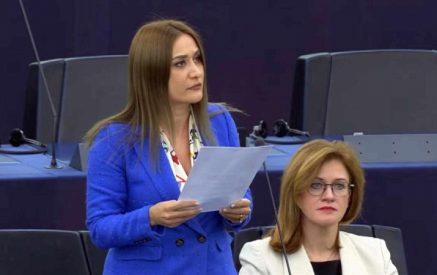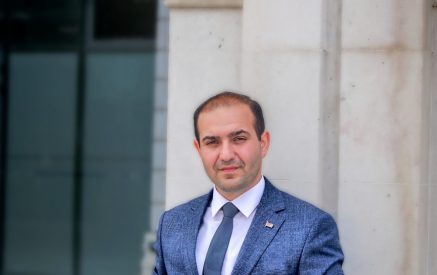The interlocutor of “Aravot” is Zhirayr Azizyan, a political scientist from Artsakh.
– Mr. Azizyan, after the tripartite meeting held in Brussels on May 14, the President of the Council of Europe, Charles Michel, announced that Armenia and Azerbaijan had confirmed the recognition of mutual territorial integrity based on the 1991 Alma-Ata Declaration. How do you evaluate the negotiation process, and what conclusions should be drawn from these statements?
If we rely on Charles Michel’s statement, which states that, based on the Almaty declaration, the parties recognize each other, in the case of Armenia, 29.8 thousand square km, and in the case of Azerbaijan 86.6 thousand square km territorial integrity, we must understand that the Almaty Declaration is not an international treaty, convention, or agreement but only a declaration. Due to its nature, that declaration does not require any member state’s ratification.
The Almaty declaration has nothing to do with Azerbaijan’s 86.6 thousand square km area because, before 1991 December 21, the adoption of the declaration, Azerbaijan declared itself the successor of the Democratic Republic of Azerbaijan, which did not include any region of Karabakh in its territorial integrity. Before that, Nagorno-Karabakh exercised its right to self-determination by the Constitution of the Soviet Union and the UN Charter without violating any legal norms.
Read also
Therefore, it could not be related to 1991 in any way with the declaration of December 21. Besides, we must note that 1991 by December 21, heavy fighting was already taking place, and the geography was constantly changing. In other words, there were no clear borders because the military operations were taking place along the entire contact line between Nagorno-Karabakh and Azerbaijan, and the boundaries were constantly changing. As for the issues of recognition of each other’s territorial integrity by Armenia and Azerbaijan, the final resolution of the conflict, and leaving Artsakh as part of Azerbaijan, these are unrelated phenomena.
First, the population of Nagorno Karabakh is the source of its problem and the settlement of the conflict. To this day, the people of Nagorno-Karabakh are supporters of the logic of continuing the uncompromising struggle in this regard. The international community has consistently recognized Nagorno Karabakh as a part of Azerbaijan’s territorial integrity after recognizing Azerbaijan’s independence and the formation of the third republic. In other words, the territorial integrity of Azerbaijan has consistently been recognized by all countries as 86.6 thousand square km area. But that same international community, first of all in the person of the Co-Chair Countries of the OSCE Minsk Group, while recognizing the territorial integrity in the negotiation process, also considered the possibility of realizing the right to self-determination within the limits of that territorial integrity. The history of the 30-year negotiation process shows that there were negotiation proposals in which the possibility of NK self-determination was considered. Therefore, there is no need to think that the recognition of the territorial integrity of Azerbaijan can close the page.
We are dealing not only with Azerbaijan but also with its allied states, and unfortunately, Armenia has remained alone in this regard and has yet to have the potential to face the Turkish-Azerbaijani world. Therefore, based on the geopolitical realities and the violation of the balance of power, we must understand that the more Armenia continues to act as a representative of the interests of Artsakh and the Artsakh Armenians, the more vulnerable it will become.
Therefore, we should look for opportunities so that Artsakh becomes a direct party to the conflict. The conflict cannot be resolved because the same international community, which recognizes and has consistently recognized the territorial integrity of Azerbaijan, continues to insist that the conflict remains unresolved and there is a need for settlement.
– In the created situation, what opportunities do you see for Artsakh to become a party to the conflict?
– Regarding opportunities, we should raise the issues of security and rights, not status. The more we raise the issue of status and consider status as a separate international entity, the more vulnerable we become from the point of view of the international community. First of all, we should raise the issue of rights and security. But these security guarantees should be sufficient for the beneficiaries, the Armenians of Artsakh.
The guarantees that will be sufficient for Artsakh Armenians cannot assume such a status of Artsakh that will be under the control of Azerbaijan. First, we should consider the legal processes and take steps in this direction. Naturally, everything needs to be clarified in international relations, but our task is not only to consider these realities.
Of course, there is no explicit guarantee that we will succeed, but if there is even a tiny chance, we should use it and invest as much effort as possible, attracting a lot of resources to make it possible.
Roza HOVHANNISYAN


























































